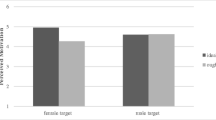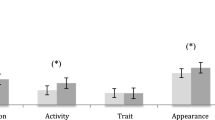Abstract
Three hundred and ten college undergraduate students completed the Bem Sex-Role Inventory and Rotter's Internal-External Scale measuring locus of control. Males were significantly more internal than females. Both males and females who had high same-sex scale scores were significantly more internal than those with low same-sex scale scores. That is, males who were masculine or androgynous and females who were feminine or androgynous reported greater internal locus of control beliefs than did those males who were feminine or undifferentiated and those females who were masculine or undifferentiated. It was suggested that these findings result from different styles of power typically associated with sex-role stereotypes.
Similar content being viewed by others
References
Bem, S. L. The measurement of psychological androgyny. Journal of Consulting and Clinical Psychology, 1974, 42, 155–162.
Bem, S. L. Sex-role adaptability: One consequence of psychological androgyny. Journal of Personality and Social Psychology, 1975, 31, 634–643.
Bem, S. L. On the utility of alternative procedures for assessing psychological androgyny. Journal of Consulting and Clinical Psychology, 1977, 45, 196–205.
Bem, S. L., & Lenney, E. Sex-typing and the avoidance of cross-sex behavior. Journal of Personality and Social Psychology, 1976, 33, 48–54.
Bennett, E., & Cohen, L. Men and women: Personality patterns and contrasts. Genetic Psychology Monographs, 1959, 59, 101–155.
Berzins, J. I. New perspectives on sex roles and personality dimensions. Paper presented at the meeting of the American Psychological Association, Chicago, August 1975.
Berzins, J. I., Welling, M. A., & Wetter, R. E. The PRF ANDRO scale user's manual (revised). Unpublished manuscript, University of Kentucky, 1976.
Block, J. H. Conceptions of sex role: Some cross-cultural and longitudinal perspectives. American Psychologist, 1973, 28, 512–526.
Broverman, I. K., Vogel, S. R., Broverman, D. K., Clarkson, F. E., & Rosenkrantz, P. S. Sex-role stereotypes: A current appraisal. Journal of Social Issues, 1972, 28, 59–78.
Carlson, R. Sex differences in ego functioning: Exploratory studies of agency and communion. Journal of Consulting and Clinical Psychology, 1971, 37, 267–277.
Carlson, R. Understanding women: Implications per research and theory. Journal of Social Issues, 1972, 28, 17–32.
Constantinople, A. Masculinity-femininity: An exception to a famous dictum. Psychological Bulletin, 1973, 80, 389–407.
Deaux, K. The behavior of women and men. Monterey, Calif.: Brooks/Cole, 1976.
Falbo, T. Relationships between sex, sex role, and social influence. Psychology of Women Quarterly, 1977, 2(1), 62–72.
Hefner, R., Rebecca, M., & Oleshansky, B. Development of sex-role transcendence. Human Development, 1975, 18, 143–158.
Heilbrun, A. B. Measurement of masculine and feminine sex role identities as independent dimensions. Journal of Consulting and Clinical Psychology, 1976, 44, 183–190.
Hochreich, D. J. Sex-role stereotypes for internal-external control and interpersonal trust. Journal of Consulting and Clinical Psychology, 1975, 43(2), 273.
Joe, V. C. Review of the internal-external control construct as a personality variable. Psychological Reports, 1971, 28, 619–640.
Johnson, P. Women and power: Toward a theory of effectiveness. Journal of Social Issues, 1976, 32(3), 99–110.
Lefcourt, H. M. Internal versus external control of reinforcement: A review. Psychological Bulletin, 1966, 65(4), 206–220.
Lefcourt, H. M. Locus of control: Current trends in theory and research. Hillsdale, N.J.: Lawrence Erlbaum Associates, 1976.
Maccoby, E. E., & Jacklin, C. N. The psychology of sex differences. Stanford: Stanford University Press, 1974.
Minnegerode, F. A. Attitudes toward women, sex-role stereotyping and locus of control. Psychological Reports, 1976, 38, 1301–1302.
Pleck, J. H. Masculinity-femininity: Current and alternate paradigms. Sex Roles, 1975, 1, 161–178.
The Random House Dictionary of the English Language. New York: Random House, 1966.
Rebecca, M., Hefner, R., & Oleshansky, B. A model of sex-role transcendence. Journal of Social Issues, 1976, 32, 197–206.
Rotter, J. B. Generalized expectancies for internal versus external control of reinforcement. Psychological Monographs, 1966, 80(1) (Whole No. 609).
Spence, J. T., Helmreich, R., & Stapp, J. Ratings of self and peers on sex role attributes and their relation to self-esteem and conceptions of masculinity and femininity. Journal of Personality and Social Psychology, 1975, 32, 29–39.
Author information
Authors and Affiliations
Rights and permissions
About this article
Cite this article
Johnson, S.J., Black, K.N. The relationship between sex-role identity and beliefs in personal control. Sex Roles 7, 425–431 (1981). https://doi.org/10.1007/BF00288070
Issue Date:
DOI: https://doi.org/10.1007/BF00288070




